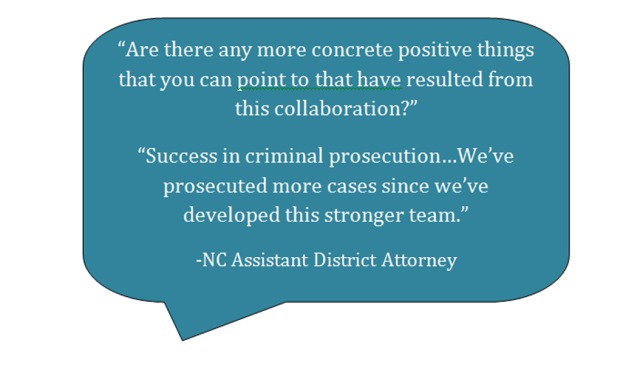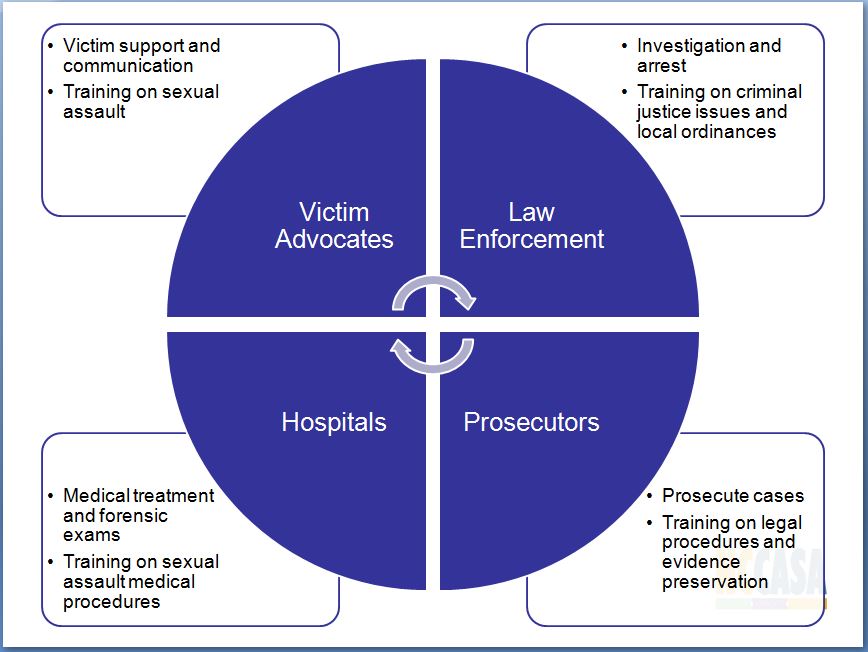Sexual Assault Response Teams
What is a SART?
“A Sexual Assault Response Team (SART) is a multidisciplinary collaboration that brings together the various professionals who address sexual assault with the goal of improving the local response to victims/survivors of sexual assault. Some communities use different names and acronyms for these teams, such as Sexual Assault Interagency Council (SAIC) or Sexual Assault Protocol Team (SAPT), but the fundamental purpose is the same: to improve the coordination and enhance the response to sexual assault in a particular service area”
(J. Engelking, S. Florman. (2015). Sexual Assault Response Team Starter Kit: A guide for new SART teams, Sexual Violence Justice Institute).
What do SARTs do?
There are generally 2 types of SARTs- acute response and systems focused
(J. Engelking, S. Florman. (2015). Sexual Assault Response Team Starter Kit: A guide for new SART teams, Sexual Violence Justice Institute).
- Acute response teams are generally more focused on individual cases. They may engage in individual case reviews of victims and provide case management to victims
- Systems focused response teams work together to see the whole picture of sexual assault response. These teams’ goal is usually to improve overall system response and improve collaboration among all those involved in supporting sexual assault survivors. These teams often look at policies and procedures across disciplines and work to identify gaps and barriers when it comes to serving sexual assault victims.
Reasons to develop a SART in your community
(Sexual Violence Justice Institute, Minnesoata Coalition Against Sexual Assault. (2015). Sexual Assault Response Teams & Systems Change). (J. Engelking, S. Florman. (2015). Sexual Assault Response Team Starter Kit: A guide for new SART teams, Sexual Violence Justice Institute).
- Enhancing the strengths of practice, policy, procedures, and collaboration
- Addressing the shortcomings of practice, policy, procedures, and collaboration
- Ensuring support and engagement for victims throughout all processes
- Continuously improving as time and communities change
- Meeting an identified need within the community
- Fulfilling a funding requirement
- Fulfilling a legislative mandate
- Strengthening relationships between service providers
- Formalizing processes and relationships that already are in place
 Resources to support your work:
Resources to support your work:
In collaboration with the NC Coalition Against Domestic Violence, NCCASA has developed the following toolkits to guide North Carolina communities that are interested in increasing their collaboration across disciplines to more effectively respond to sexual and/or domestic violence.
- Enhancing Local Collaboration in the Criminal Justice Response to Domestic Violence and Sexual Assault: A CCR/SART Development Toolkit
- Best Practices in the Criminal Justice Response to Domestic Violence and Sexual Assault: Guidance for CCR/SART Response Protocols
Additional resources:
- svji.org Considerations for Team Formation
- Sexual Assault Response Team Starter Kit: A Guide for New SART Teams
- Enhancing Local Collaboration in the Criminal Justice Response to Domestic Violence and Sexual Assault: A CCR/SART Development T
- Best Practices in the Criminal Justice Response to Domestic Violence and Sexual Assault: Guidance for CCR/SART Response Protocol
- Sexual Assault Response Team (SART) Functioning and Effectiveness
- Sexual Assault Response Teams & Systems Change
If you would like further support in deciding if a SART team is right for your community or need support with your current SART, please feel free to reach out to an NCCASA staff member or [email protected] to get connected.


